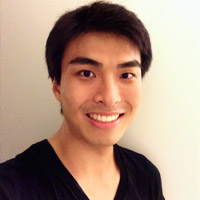
Student Perspective: Ye Henry Li

Structural Biology
Lab: Dr. Wing Hung Wong
Why did you choose to come to graduate school at Stanford University? What attracted you to the Biosciences PhD Programs?
I chose to come to Stanford because of its research environment and proximity to Silicon Valley. Mirroring the Silicon Valley culture, the Biosciences PhD programs foster many opportunities for interdisciplinary work and collaborations.
Describe your research.
I study the dynamics of the human embryonic stem cell gene network, and I develop inference procedures for learning gene networks. By understanding how gene networks behave and influence cell fate, researchers can gain greater control in cell reprogramming procedures for regenerative medicine. To accomplish these goals, I utilize experimental and computational tools in biology and statistics.
Why did you choose to join your lab?
When I was an undergraduate, I double majored in Statistics and Biochemistry, and I performed research in the Structural Biology and Biophysics fields. So when I searched for a lab at Stanford, I wanted to find a professor who was well-versed in both experimental techniques and computational methods and a lab that would allow me to cultivate skill sets in both areas. After a year of searching, I finally found my fit in the Wong Lab in the Statistics Department.
When I joined the lab, I worked closely with two very intelligent colleagues, Arwen Meister and Bokyung Choi, a mathematician and a physicist, respectively. Our subgroup's research is very interdisciplinary and requires deep understanding of molecular biology, stem cell biology, mathematics, statistics, and computer science. The experience of collaboration is exhilarating because everyone matters in the project—we worked as a true team. In addition, I saw that alumni of the Wong Lab have gone on to start successful companies or directly became professors. It was very clear that the lab fosters creativity. I am enjoying my graduate school experience mostly because I have found the right lab for my intellectual growth.
What do you like about living in the Bay Area?
I grew up in the Bay Area, and I could not leave this place! Life is very fast here because there are always many new things to do: trying out authentic foreign cuisines, learning expressions in different languages, studying arts and dance on the weekends, seeing some of the most beautiful places in the world—all within driving distance. Being culturally diverse is a natural part of life in the Bay Area.
Do you have any advice to share with prospective students?
You are already a scientist. The journey through the PhD program will make you a better scientist by giving you the opportunity to be part of projects you cannot carry out in your home kitchen. The PhD experience is different for each person, but don't let it define 100 percent of your life for the next 5-6 years. While working on your degree, try to explore other avenues of the human experience, and this will make you a well-rounded and happy person in the long run.
